pep小学英语总复习句型短语语法
小学英语PEP四年级上册句型总汇

小学英语PEP四年级上册短语句型汇总汇Words in PEP Book3 (四会单词要求会听、说、读、默写)bag 包pencil 铅笔pen 钢笔book 书ruler 尺子pencil-case 铅笔盒teacher 教师student 学生boy 男孩girl 女孩friend 朋友home 家room 房间school 学校classroom 教室window 窗户desk 课桌;书桌door 门chair 椅子bed 床rice 米饭beef 牛肉bread 面包milk 牛奶egg 蛋water 水chicken 鸡肉 f ish 鱼sister 姐妹brother 兄弟father 父亲;爸爸mother 母亲;妈妈driver 司机doctor 医生farmer 农民nurse 护士Sentences in PEP Book3 (重点句型)Uint1What’s in the classroom? 在教室里有什么?A board, two lights, many desks and chairs一个黑板, 两盏电灯, 许多桌子和椅子……Open the door. 打开门。
Sweep the floor. 扫地板。
Put up the picture. 挂图片。
Turn on the light. 打开灯。
Clean the window. 擦窗户。
Clean the board. 擦黑板。
This is…, our n ew classmate. 这是……,我们的新同学。
Let’s go and have a look. (let’s = let us) 让我们去看一看。
Where’s my seat?It’s near the door. (where 哪里)我的座位在哪里? 它在门附近。
This is my classroom. The wall is white. The floor is green…. (colour)这是我的教室。
小学pep短语归纳总结

小学pep短语归纳总结在小学的英语学习中,学生们常常会遇到各种各样的短语。
这些短语在日常交流中非常常见,有效地帮助学生提高英语表达能力。
在本文中,我们将对小学PEP教材中常用的短语进行归纳总结,并提供相关的例句,以便学生们更好地掌握和运用这些短语。
一、问候与介绍短语1. Good morning/afternoon/evening. 早上/下午/晚上好。
- Good morning, teacher! 早上好,老师!2. What's your name? 你叫什么名字?- My name is Tom. 我叫汤姆。
3. Nice to meet you. 很高兴见到你。
- Nice to meet you, too. 见到你也很高兴。
4. How are you? 你好吗?- I'm fine, thank you. And you? 我很好,谢谢。
你呢?二、日常用语短语1. Can I go to the washroom, please? 我可以去洗手间吗?- Yes, you can. 是的,你可以去。
2. Can I have some water? 我可以喝点水吗?- Of course, here you are. 当然可以,给你。
3. I'm sorry. 对不起。
- That's OK. 没关系。
4. Excuse me. 打扰一下。
- Excuse me, can you help me? 打扰一下,你能帮我吗?三、课堂用语短语1. May I come in? 我可以进来吗?- Yes, please come in. 是的,请进。
2. May I borrow a pencil, please? 我可以借一支铅笔吗?- Sure, here you go. 当然可以,给你。
3. I don't understand. 我不明白。
- Can you explain it again? 你可以再解释一遍吗?4. Can you help me, please? 你可以帮帮我吗?- Of course, what can I do for you? 当然可以,你需要我做什么?四、描述事物短语1. It's big/small. 它很大/小。
小学人教PEP英语四年级上册重点单词、短语、句型汇总
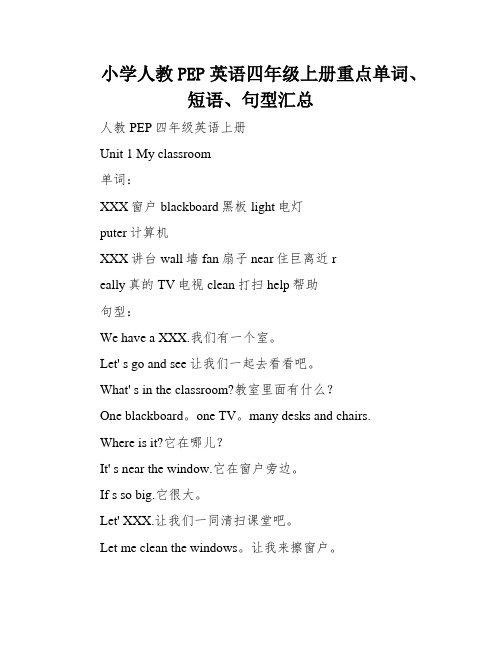
小学人教PEP英语四年级上册重点单词、短语、句型汇总人教PEP四年级英语上册Unit 1 My classroom单词:XXX窗户blackboard黑板light电灯puter计算机XXX讲台wall墙fan扇子near住巨离近really真的TV电视clean打扫help帮助句型:We have a XXX.我们有一个室。
Let' s go and see让我们一起去看看吧。
What' s in the classroom?教室里面有什么?One blackboard。
one TV。
many desks and chairs.Where is it?它在哪儿?It' s near the window.它在窗户旁边。
If s so big.它很大。
Let' XXX.让我们一同清扫课堂吧。
Let me clean the windows。
让我来擦窗户。
Look。
This is the new classroom。
The door is orange.看!这是新白勺课堂。
门是橙色的。
短语:L地址类:on the wall在墙上near the window在窗户中间in the classroom在课堂里on the fan在电扇上near the computer在计较机中间2.举措类:clean the desks and chairs干净桌椅clean the windows擦窗户XXX清算鱼缸open the door开门turn on the light开灯sweep the floor扫地putup the picture张帖丹青clean the classroom清扫课堂clean the teacher5s desk干净讲台close the window关窗turn on the light开灯put up the picture挂丹青clean theblackboard擦黑板3.其他类:a new classroom—间新课堂excuse me驾临,对不起语法点:where指导的是非凡疑问句,“那里”,看到where就要想到地址,方位词,比方on。
pep语法六年级英语知识点

pep语法六年级英语知识点PEP语法六年级英语是我国小学英语教材中的一部分,旨在帮助学生系统地学习和掌握英语语法知识。
下面将介绍几个重要的知识点,以便学生更好地理解和运用英语语法。
1. 一般现在时(Simple Present Tense)一般现在时表示经常性动作或存在的状态。
一般现在时的肯定句结构为:主语 + 动词原形(第三人称单数加s/es)。
例如:I watch TV every day.(我每天看电视。
)He goes to school by bus.(他坐公交车上学。
)2. 一般过去时(Simple Past Tense)一般过去时表示过去发生的动作或存在的状态。
一般过去时的肯定句结构为:主语 + 动词过去式。
例如:We played football yesterday.(我们昨天踢足球。
)She visited her grandparents last week.(上周她去看望了她的祖父母。
)3. 一般将来时(Simple Future Tense)一般将来时表示将来要发生的动作或存在的状态。
一般将来时的肯定句结构为:主语 + will + 动词原形。
例如:We will have aparty next week.(我们下周将举办一场派对。
)He will travel to Beijing in the summer vacation.(暑假他将去北京旅行。
)4. 现在进行时(Present Continuous Tense)现在进行时表示现阶段正在进行的动作。
现在进行时的肯定句结构为:主语 + am/is/are + 动词-ing形式。
例如:They are playing basketball now.(他们正在打篮球。
)She is reading a book at the moment.(她此刻在看书。
)5. 祈使句(Imperative Sentence)祈使句用于表达请求、命令或建议。
pep小学英语总复习(句型-短语-语法)

pep⼩学英语总复习(句型-短语-语法)PEP 三到六年级的动词词组answer the phone接buy a present买礼物catch butterflies捉蝴蝶clean the room 打扫房间climb mountains爬⼭collect stamps收集邮票come from来⾃,从……来cook dinner做饭cook the meals做饭do an experiment做实验do homework做作业do morning exercises做早操do housework做家务do the dishes 刷碗drink water 喝⽔draw pictures画画eat breakfast吃早饭lunch ,午饭dinner,晚饭, at home 在家fly kites放风筝go to bed睡觉go to school上学go to the cinema去看电影go to a park 去公园go to work上班go home 回家go swimming 去游泳go fishing 去钓鱼go hiking 去郊游go ice-skating 去滑冰go skiing 去滑雪go shopping 去购物go straight 直⾏get up起床have a picnic举⾏野餐have breakfast吃早餐have lunch吃午餐have dinner吃晚饭have Chinese classhave English class上英语课have music class上⾳乐课have P.E. class上体育课have math class上数学课have a cold 感冒have a fever 发烧have a sore throat 嗓⼦疼have a headache 头疼have a toothache ⽛疼like + doing 喜欢做某事look at看……live in 居住listen to music听⾳乐learn Chinese (学中⽂) make a snowman堆雪⼈make kites制作风筝make the bed铺床plant trees种树play chess下棋sweep the floor扫地play football踢⾜球play ping-pong 打乒乓球play sports 做活动play the violin拉⼩提琴play the piano弹钢琴play with…… 玩… put on 穿上read a book看书read books看书read a magazine阅读杂志set the table摆餐具sing and dance (唱歌跳舞) take a trip去旅⾏take some medicine 吃些药see the doctor看医⽣take (took) pictures照相turn left 向左转turn right向右转visit grandparents看望(外)祖⽗母write a letter写信write an 写电⼦water the flowers浇花wash the clothes洗⾐服watch insects观察昆⾍watch TV看电视have to必须go there去那open the door开门close the window关窗by bike骑车in the morning在早晨in the afternoon在下午at night在晚上in the evening在夜晚last Sunday上个星期天on the weekend在周末⼩学英语四种时态复习。
新版PEP小学英语三到六年级各单元重点句型汇总

新版PEP小学英语三到六年级各单元重点句型汇总三年级上册__Unit1 【句子】1、Hello, I’m Wu Yifan. 你好,我是吴一凡。
2、Hi, I’m Sarah. 你好,我是萨拉3、I have a ruler / an eraser.我有一把尺子/一块橡皮。
4、-What’s your name ? 你叫什么名字?-My name’s John. 我叫约翰。
5、-Goodbye! 再见!-Bye, Miss White. 再见,怀特小姐。
Unit2 【句子】1、--Mr Jones, this is Miss Green.琼斯先生,这是格林小姐。
-Good morning, Miss Green.早上好,格林小姐。
2、I see red.我看见红色。
3、Good afternoon, Wu Yifan.下午好,吴一凡。
4、-Nice to meet you.见到你很高兴。
-Nice to meet you, too.见到你也很高兴。
5、Colour it brown!把它涂成棕色吧!Unit31、--How are you?你好吗?--I’m fine, thank you.我很好,谢谢你。
--Let’s go to school! 我们一起上学吧!2、Look at me !看我!3、Very well, thanks.很好,谢谢。
4、--Let’s make a puppet!(让)我们一起做个木偶吧!--Great! 太棒了!Unit4【句子】1、--What’s this?这是什么?-- It’s a duck.(它)是只鸭子。
2、What’s that?那是什么?3、Cool! I like it.酷!我喜欢它。
Unit5【句子】1、-- I’d like some juice, please.请给我些果汁。
--Here you are.给你。
2、Have some bread.吃点面包吧!3、I’m hungry!我饿了!4、Can I have some water, please?请给我些水好吗?5、You’re welcome.不用谢Unit6【句子】1、--This one, please.请给我这个。
(全书完整版)人教版pep小学英语语法总结
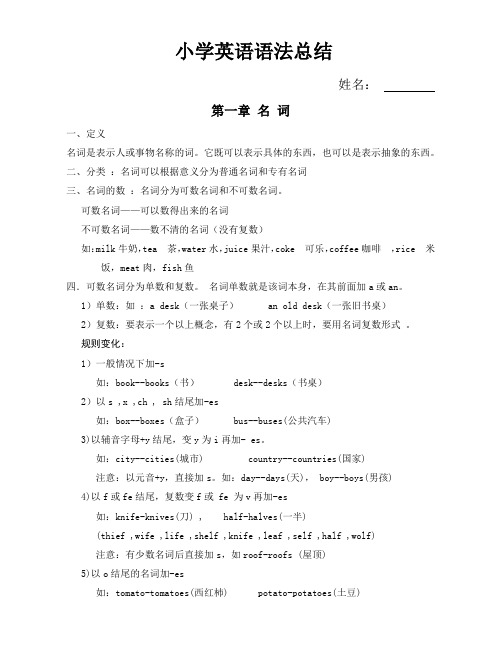
小学英语语法总结姓名:第一章名词一、定义名词是表示人或事物名称的词。
它既可以表示具体的东西,也可以是表示抽象的东西。
二、分类:名词可以根据意义分为普通名词和专有名词三、名词的数:名词分为可数名词和不可数名词。
可数名词——可以数得出来的名词不可数名词——数不清的名词(没有复数)如:milk牛奶,tea 茶,water水,juice果汁,coke 可乐,coffee咖啡,rice 米饭,meat肉,fish鱼四.可数名词分为单数和复数。
名词单数就是该词本身,在其前面加a或an。
1)单数:如:a desk(一张桌子) an old desk(一张旧书桌)2)复数:要表示一个以上概念,有2个或2个以上时,要用名词复数形式。
规则变化:1)一般情况下加-s如:book--books(书) desk--desks(书桌)2)以s ,x ,ch , sh结尾加-es如:box--boxes(盒子) bus--buses(公共汽车)3)以辅音字母+y结尾,变y为i再加- es。
如:city--cities(城市) country--countries(国家)注意:以元音+y,直接加s。
如:day--days(天), boy--boys(男孩)4)以f或fe结尾,复数变f或 fe 为v再加-es如:knife-knives(刀) , half-halves(一半)(thief ,wife ,life ,shelf ,knife ,leaf ,self ,half ,wolf) 注意:有少数名词后直接加s,如roof-roofs (屋顶)5)以o结尾的名词加-es如:tomato-tomatoes(西红杮) potato-potatoes(土豆)注意:zero 两种方式都可:zero-zeros或 zeroes(零)不规则变化1) 元音字母发变化。
如:man--men(男人) , woman--women(妇女) tooth--teeth(牙齿) ,mouse--mice(老鼠) , policeman--policemen(警察) foot--feet(脚) 2) 词尾发生变化。
小学PEP3-6年级英语语法总结(最全).

小学英语语法总结一、时态小结凡是在must, mustn’t, can, can’t, let’s, don’t, may,will后的一定要用动词的原形二、名词的复数。
名词按其数,可分两种:可数名词和不可数名词.可数名词的复数变化规则:1. 一般情况下,直接在词尾加-s, 如:girl-girls, book-books, pen-pens2. 以s,x,sh,ch结尾的词,在词后加-es, 如:class-classes, box-boxes, match-matches,3. 以辅音字母+y结尾的,变y 为i 再加-es, 如:city-cities, family-families, country- countries4. 以f或fe结尾的,变f或fe为v再加-es, 如:knife-knives, wife-wives, life-lives,5. 以o 结尾的加-es或-s, 如: radio-radios, tomato-tomatoes, potato-potatoes, zoo-zoos, photo-photos,6. man-men, woman-women, foot-feet, child-children,三、形容词的比较级、最高级。
形容词有比较级与最高级之分, 单音节词的变化规则:1. 一般情况下,直接在词尾加-er或-est, 如:small-smaller-smallest, short-shorter-shortest2. 以e结尾的,加-er或-est, 如:large-larger-largest, nice-nicer-nicest.3.以辅音字母+y结尾的, 变y 为i 再加-er或-est, 如:busy-busier-busiest, heavy-heavier-heaviest.4. 以重读闭音节,一个辅音字母结尾的,双写该字母,再加-er或-est, 如:big-bigger-biggest, thin-thinner-thinnest.5. 多音节的词,前加more, most, 如: beautiful-more beautiful-most beautiful.6. good-better-best四、be 动词,助动词。
(完整版)人教版(PEP)小学英语六年级上册复习资料
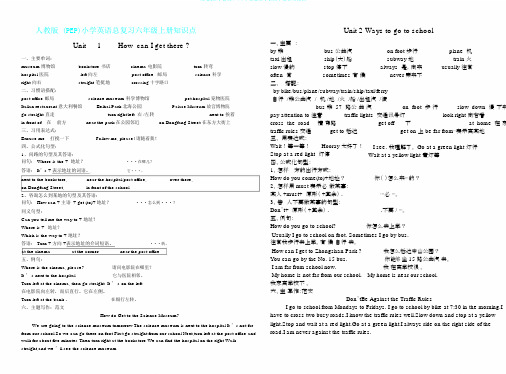
人教版 (PEP)小学英语总复习六年级上册知识点Unit1How can I get there ?一、主要单词:museum 博物馆bookstore 书店cinema 电影院turn 转弯hospital 医院left 向左post office邮局science 科学right 向右straight 笔挺地crossing 十字路口二、习惯语搭配:post office 邮局science museum 科学博物馆pet hospital 宠物医院Italian restaurant 意大利餐馆Beihai Park 北海公园Palace Museum 故宫博物院go straight 直走turn right/left 右 /左转next to 挨着in front of... 在 ...前方near the park 在公园邻近on Dongfang Street 在东方大街上三、习用表达式:Unit 2 Ways to go to school一、主要:by 乘bus 公共汽on foot 步行plane 机taxi 出租ship(大)船subway 地train 火slow 慢的stop 停下always 是,向来usually 往常often 常sometimes 有候never 素来不二、搭配:by bike/bus/plane/subway/train/ship/taxi/ferry自行 /乘公共汽 / 机 /地 /火 /船 /出租汽 /渡bus 乘 57 路公共汽on foot 步行slow down 慢下来pay attention to 注意traffic lights 交通讯号灯look right 向右看cross the road横穿路get off下at home 在家traffic rules 交通get to 抵达get on 上be far from⋯表示离某地Excuse me打搅一下Follow me, please! 请随着我!四、公式化句型:1、问路的句型及其答语:问句: Where is the + 地址?···在哪儿?答语: It’s + 表示地址的词语。
PEP小学英语语法大全
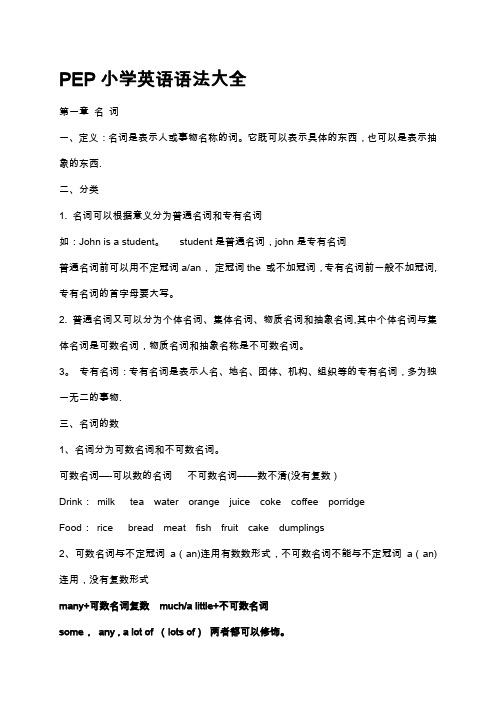
PEP小学英语语法大全第一章名词一、定义:名词是表示人或事物名称的词。
它既可以表示具体的东西,也可以是表示抽象的东西.二、分类1. 名词可以根据意义分为普通名词和专有名词如:John is a student。
student是普通名词,john是专有名词普通名词前可以用不定冠词a/an,定冠词the 或不加冠词,专有名词前一般不加冠词,专有名词的首字母要大写。
2. 普通名词又可以分为个体名词、集体名词、物质名词和抽象名词,其中个体名词与集体名词是可数名词,物质名词和抽象名称是不可数名词。
3。
专有名词:专有名词是表示人名、地名、团体、机构、组织等的专有名词,多为独一无二的事物.三、名词的数1、名词分为可数名词和不可数名词。
可数名词—-可以数的名词不可数名词——数不清(没有复数)Drink:milk tea water orange juice coke coffee porridgeFood:rice bread meat fish fruit cake dumplings2、可数名词与不定冠词a(an)连用有数数形式,不可数名词不能与不定冠词a(an)连用,没有复数形式many+可数名词复数much/a little+不可数名词some,any , a lot of (lots of)两者都可以修饰。
3、可数名词可以直接用数词来修饰不可数名词:数词+量词+of + 名词对可数名词的数量提问用how many对不可数名词的数量提问用how much4、不可数名词的量有以下两种表示方法:1) some, much ,a little ,a lot of ,a bit of ,plenty of 用等表示多少。
※既可以与可数名词复数,又可以与不可数名词连用的有:plenty of ,some ,a lot of ,lots of ,most of 等。
如there is much water in the bottle .瓶中有很多水.i'll tell you much good news。
人教版新版PEP小学六年级上册英语短语表

人教版新版PEP小学六年级上册英语短语表一、日常会话短语- Hello! 你好!- Good morning/afternoon/evening! 早上/下午/晚上好!- How are you? 你好吗?- I'm fine, thank you. And you? 我很好,谢谢。
你呢?- What's your name? 你叫什么名字?- My name is [name]. 我叫[name]。
- Nice to meet you! 很高兴认识你!- How old are you? 你几岁了?- I'm [age] years old. 我[age]岁了。
- Where are you from? 你来自哪里?- I'm from [place]. 我来自[place]。
- What's your favorite color/food/sport, etc.? 你最喜欢的颜色/食物/运动等是什么?二、常用动词短语- Go to school 去学校- Study English 研究英语- Play football 踢足球- Eat breakfast/lunch/dinner 吃早餐/午餐/晚餐- Get up 起床- Go to bed 上床睡觉- Brush teeth 刷牙- Wash hands 洗手- Listen to music 听音乐- Watch TV 看电视- Read a book 阅读一本书三、常用名词短语- School bag 书包- Classroom 教室- Textbook 课本- Pen 钢笔- Pencil 铅笔- Eraser 橡皮擦- Ruler 尺子- Sports field 运动场- Library 图书馆- Teacher 老师- Student 学生四、常用句型短语- What's this/that? 这/那是什么?- It's a [object]. 这是一个[object]。
(完整版)PEP小学英语重点语法总结与分析

PEP小学英语重点句型语法总结与分析三年级起点的人教版PEP教材在小学阶段共有8册书,其涉及的重要语法知识主要有7种:to be句型、there be 句型、一般现在时句型、现在进行时句型、一般过去时句型、情态动词can引导的句型、be going to句型等。
现以5——8册书为例,简要分析如下:[一] to be句型:用于介绍个人情况如姓名、健康状况、身份、国籍、家庭成员、朋友、职业等,描述地点、颜色、四季、日期、星期几等,该句型广泛分布于各册教材中,其中5——8册的句型主要有:1. Who’s yo ur English teacher? Mr. Carter.2. What’s he like?He’s tall and strong.3. Is she quiet? No, she isn’t.She is very active.4. Is she strict? Yes, she is, but she’s very kind.5. What day is it today? It’s Wednesday.6. What’s your favourite fruit/food…?7. They’re sweet/ sour/ salty/ healthy/…8. When is your birthday? It’s in May.9. My birthday is in June. Uncle Bill’s birthday is in June, too.10. Is her birthday in June? Yes, it is.11. What’s the date?12.This is Zhang Peng.13. W here is the cinema, please? It’s next to the hospital.14. How tall are you?I’m 164 cm tall.15. You are shorter than me.16.You’re 4 cm taller than me.17.How heavy are you? I’m 48 kg.18. I’m thinner than you, and shorter.19. What’s the matte r with you? My throat is sore.20. How are you, Liu Yun / Sarah?[二] there be句型:表示存在,即:“某处有某物”或“某时有某事”。
PEP小学六年级英语重点知识总结归纳
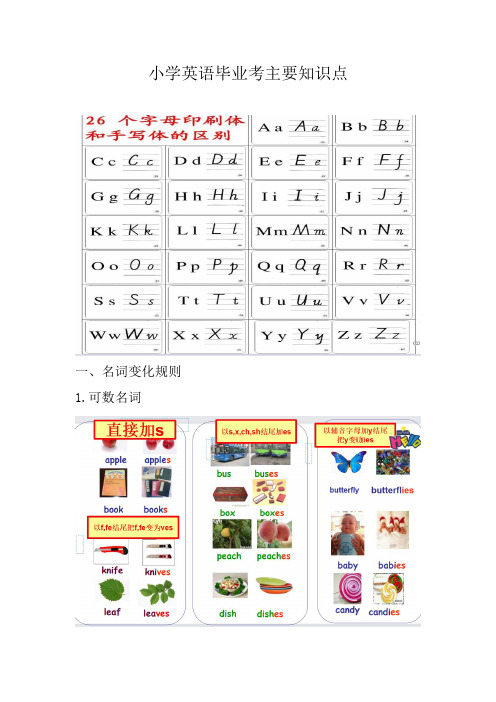
小学英语毕业考主要知识点
一、名词变化规则
1.可数名词
2.不可数名词
二、代词
三、代词(人称代词和指示代词)与be 动词
四、形容词变化规则
五、时态与动词
(1)一般过去式:主语+动词过去式(ed) (主题:过去活动:last weekend)
规则变化
不规则变化
(2)一般将来时态:(主题:计划)
A.主语+be(am,is,are)+going to+ 动词原级
B.主语+Will+ 动词原级
(3)一般现在时态下三单+动词(s/es)
主题:介绍家庭成员给笔友或介绍笔友给家庭成员
同样的方式介绍家庭其他成员
重要语法点:
三单+频度副词+动词s/es
爱好:
三单+likes+动词ing
Does+动词原级
(4)现在进行时态:主语+动词现在分词(V+ing)
二、季节话题
还有天气、颜色、衣服话题可以加入该主题。
新PEP小学英语六年级上册复习资料
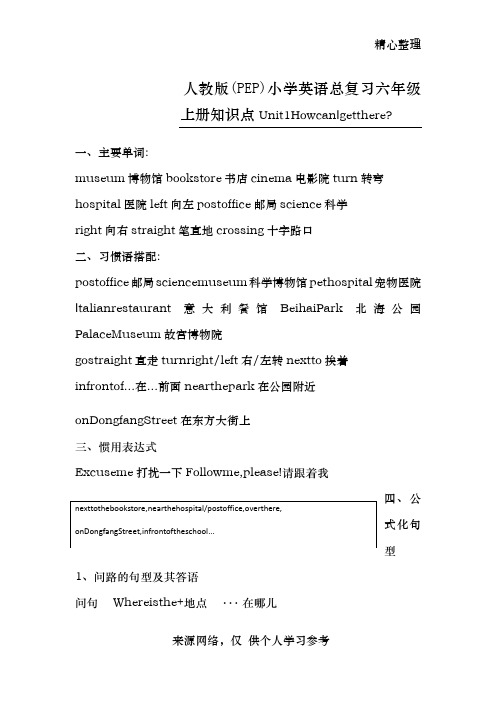
精心整理人教版(PEP)小学英语总复习六年级上册知识点Unit1Howcan I getthere? 一、主要单词:museum 博物馆bookstore 书店cinema 电影院turn 转弯:sciencemuseum talianrestaurantExcuseme 打扰一下 1Whereisthe+nexttothebookstore,nearthehospital/postoffice,overthere,I t’s+表示地点的词语。
它···。
2Howcan+主语+get(to)+the+Canyoutellmethewayto+Whereis+Whichisthewayto+Turn+方向+表示地点的介词短语。
atthecinemaatthecornernearthepostoffice...Whereisthecinema,please?I t’snexttothehospital.它与医院相邻。
Turnleftatthecinema,thengostraight.I t’sontheleft.在电影院向1、Whereisthemuseumshop?博物馆商店在哪里?I t’snearthedoor.他在门附近。
2、Whereisthepostoffice?邮局在哪里?I t’snexttothemuseum.它与博物馆相邻。
3、Whereistherestaurant?餐馆在哪里?I t’snexttothetheparkonDongfangStreet.它与东方街上的公园相邻。
Unit2Waystogotoschoolby乘bus公共汽车onfoot步行plane飞机taxi出租车ship subway地铁train火车slow慢的stop停下always usually通常often经常sometimes有时候never从来不,永不Wait Hooray I see.绿灯行Stopataredlight红灯停Waitatayellowlight1Howdoyoucome(to)+2、如何用must某人+must++.···必须···。
(word完整版)PEP小学英语六年级上册短语及词组复习资料
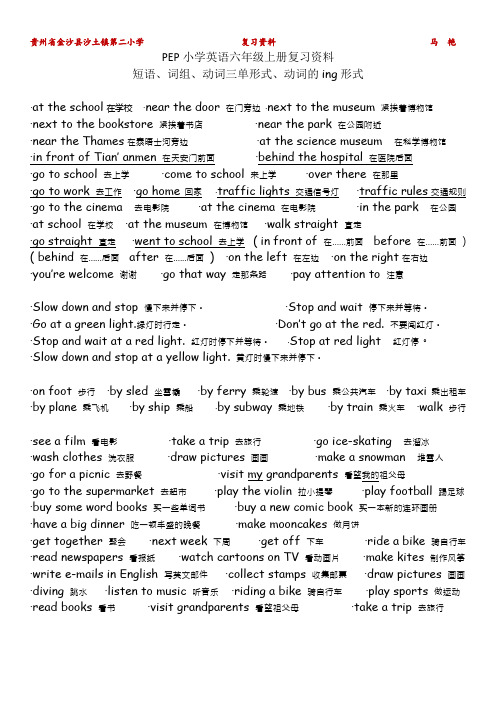
PEP小学英语六年级上册复习资料短语、词组、动词三单形式、动词的ing形式·at the school在学校·near the door 在门旁边·next to the museum 紧挨着博物馆·next to the bookstore 紧挨着书店·near the park 在公园附近·near the Thames在泰晤士河旁边·at the science museum 在科学博物馆·in front of Tian’ anmen 在天安门前面·behind the hospital 在医院后面·go to school 去上学·come to school 来上学·over there 在那里·go to work 去工作·go home回家·traffic lights 交通信号灯·traffic rules交通规则·go to the cinema 去电影院·at the cinema 在电影院·in the park 在公园·at school 在学校·at the museum 在博物馆·walk straight 直走·go straight 直走·went to school 去上学( in front of 在……前面before 在……前面) ( behind 在......后面after 在......后面) ·on the left 在左边·on the right在右边·you’re welcome 谢谢·go that way 走那条路·pay attention to 注意·Slow down and stop 慢下来并停下。
pep五年级英语语法知识点归纳
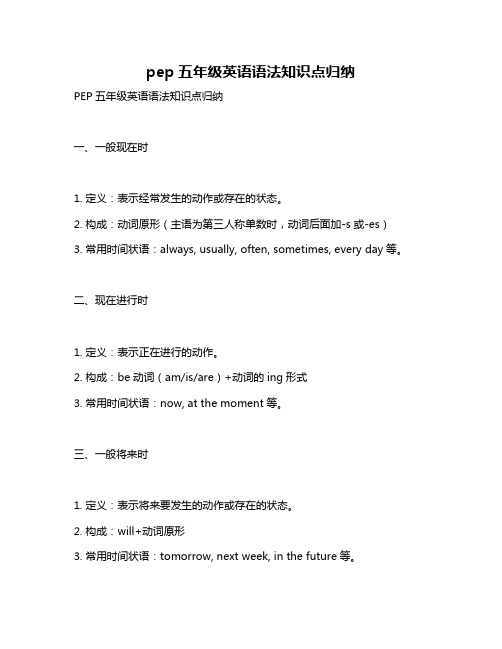
pep五年级英语语法知识点归纳
PEP五年级英语语法知识点归纳
一、一般现在时
1. 定义:表示经常发生的动作或存在的状态。
2. 构成:动词原形(主语为第三人称单数时,动词后面加-s或-es)
3. 常用时间状语:always, usually, often, sometimes, every day等。
二、现在进行时
1. 定义:表示正在进行的动作。
2. 构成:be动词(am/is/are)+动词的ing形式
3. 常用时间状语:now, at the moment等。
三、一般将来时
1. 定义:表示将来要发生的动作或存在的状态。
2. 构成:will+动词原形
3. 常用时间状语:tomorrow, next week, in the future等。
四、一般过去时
1. 定义:表示过去的动作或存在的状态。
2. 构成:动词的过去式
3. 常用时间状语:yesterday, last week, three years ago等。
五、形容词的比较级和最高级
1. 比较级:表示“更……”,形容词后面加-er。
形容词比较级前可以用more修饰。
2. 最高级:表示“最……”,形容词后面加-est。
形容词最高级前通常用the修饰,前面加most修饰。
3. 表示倍数关系的比较级:be twice the size of…(是……的两倍大)等。
PEP小学英语六年级上下全册知识点总结
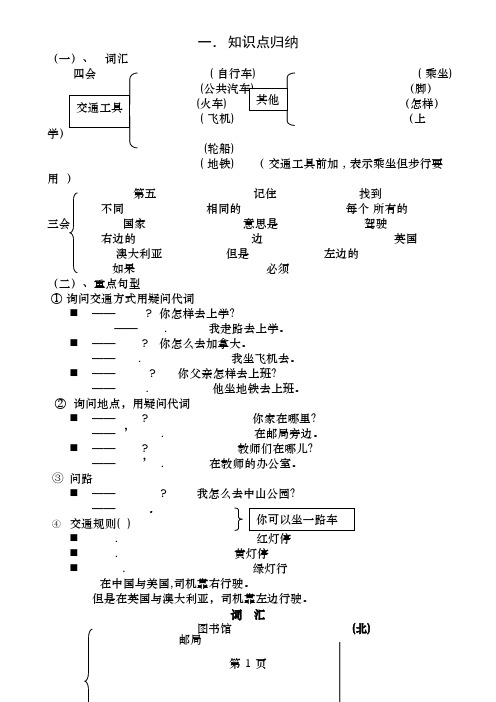
一. 知识点归纳(一)、 词汇乘坐) (脚)火车(怎样) 飞机(上轮船) ( 地铁) ( 交通工具前加 , 表示乘坐但步行要用 )第五 记住 找到不同 相同的 每个 所有的三会 国家 意思是 驾驶右边的 边 英国 澳大利亚 但是 左边的 如果 必须(二)、重点句型① 询问交通方式用疑问代词⏹ —— ? 你怎样去上学?—— . 我走路去上学。
⏹ —— ? 你怎么去加拿大。
—— . 我坐飞机去。
⏹ —— ? 你父亲怎样去上班?—— . 他坐地铁去上班。
② 询问地点,用疑问代词⏹ —— ? 你家在哪里?—— ’ . 在邮局旁边。
⏹ —— ? 教师们在哪儿?—— ’ . 在教师的办公室。
③ 问路⏹ —— ? 我怎么去中山公园?—— .④ 交通规则( )⏹ ⏹ . 黄灯停 ⏹ . 绿灯行在中国与美国,司机靠右行驶。
但是在英国与澳大利亚,司机靠左边行驶。
词 汇图书馆 (北) 邮局医院: 电影院(地点) 书店 (东) (西)科学博物馆银行学校(南)超市鞋店在哪里请与…相邻右边,正确的左边成直线地然后转弯对不起想要双分钟告诉乘坐远放学以后上车下车第十二聚会;晚会开始买句型一、问路. , ? 请问电影院在哪儿?. 在医院的旁边。
. 在学校的前面.在公园的后面’ . 在动物园的附近.. 在书店的左右边.. 在银行的东边.. 离这儿很远.. , 请问这附近有电影院吗?, . 有.. ? 我该怎样到达医院呢?二、指引路. . 你可乘坐路公交车去那儿.. …在…地方上车下车.. . 向前直走在分钟.. …在…地方向右左转.朝东西南北走…分钟.三 ? 离这儿远吗?一.知识点归纳(一)、词汇四会下周报纸今天上午漫画书今天下午杂志(时间 ) 今天晚上字典今夜明信片明天去旅游主题公园买一些水果宠物店(活动)去看电影(其他)水果摊参观长城鞋店阅读有关植物的杂志商店三会:忙碌的一起地需要其他二、重点句式与句型:本单元中出现的一个重点语法项目是一般将来时:表示将要发生的动作或状态,常与表示将来的时间连用。
人教PEP版四年级下册英语单词句型汇总

小学英语四年级(下册)期末总复习字母组合必背单词三会单词语音规则“er”/ ə / water 水sister姐妹tiger 老虎dinner 晚餐computer 电脑teacher fatherruler number“er”结尾发短音,/ ə/ / ə/ / ə/(her除外/ ə: / )“ir” / ə: / girl 女孩bird 鸟first shirt birth “ir”“ur”在中间发长音/ ə: /“ur”/ ə: / nurse 护士hamburger 汉堡purple turtle“ar”/ ɑː / car 汽车card 卡片arm 手臂farm parkfar“ar”/ ɑː /,/ ɑː // ɑː // ɑː /“al”/ ɔː /tall 高的ball 球wall墙small fall“al” / ɔː /,/ ɔː // ɔː // ɔː /“or ”/ ɔ: / fork 叉子horse 马pork shortborn corn “or ” / ɔ: / ,/ ɔ: / / ɔ: / / ɔ: /“or ”/ ɜ:/ homework 作业world map世界地图word work“or ”/ ɜ:/,/ ɜ:/ / ɜ:/ / ɜ:/“le” / l /apple苹果table 桌子people 人们uncle littlebottle purple“le”结尾/l // l // l /(l在开头发音l )四会单词三会单词Unit 1 computer room计算机library图书馆teachers’office教师办公室music room音乐教室art room美术教室playground操场gym 室内活动室garden花园first floor一楼second floor二楼next to在…旁边class班级homework作业picture图画forty四十way方向Unit 2 breakfast早餐lunch中餐dinner晚餐maths class数学课Chinese class语文课English class英语课PE class 体育课music class音乐课get up起床go to school去上学go home回家go to bed 上床睡觉for为;给o’clock点钟hurry 快点Unit 3 hot热的warm暖和的cold寒冷的cool 凉爽的snowy下雪的sunny晴朗的cloudy多云的windy刮风的rainy下雨的weather天气world 世界today今天outside外边how about怎么样degree度数London伦敦New York纽约Moscow莫斯科Singapore 新加坡Sydney悉尼Unit 4 tomato(tomato es)西红柿potato (potato es)土豆green bean s青豆carrot(carrots)胡萝卜horse(horses)马cow(cows)奶牛sheep(sheep)绵羊goat(goats)山羊lamb(lambs)羊羔hen(hens)母鸡these这些those那些animal动物garden花园farm农场aren’t=are not how many多少there那里yum好吃Unit 5 clothes 衣服jacket夹克衫shirt衬衫yours你的,你们的**skirt短裙dress连衣裙T-shirt T恤衫pants裤子hat 带沿的帽子coat大衣sweater毛衣socks袜子shoes鞋子mine我的** whose谁的pack收拾行李Unit 6 how much多少钱nice好的pretty美观的cheap便宜的expensive贵的gloves手套scarf(scarves)围巾umbrella雨伞sunglasses太阳眼镜size尺码try on试穿dollar美元more更多of course 当然熟读认识单词()听写四会单词()签名:Unit 1 Go to the library. Read a book.Go to the teachers’ office. Say Hello.Go to the playground. Play football.Go to the garden. Water the flowers.Unit 2 It’s time for breakfast. Let’s drink some milk.It’s time for lunch. Let’s have some chicken.It’s time for dinner. Let’s eat some rice.It’s time for PE class. Let’s jump and run.It’s time for English class. Let’s read and write.It’s time for music class. Let’s sing and dance.Unit 3 Brrr, it’s cold. It’s cold outside.Put on a hat. Cold, byebye!Mmm! It’s warm. It’s warm inside.Take off your shoes. It feels so nice.Unit 4 I like tomatoes. I like potatoes.Carrots I will try. I love to eat green beans.But onions make me cry.Unit 5 Put on your shirt. Hang up your dress.Take off your hat. Wash your skirt.Put away your pants.熟读背诵()签名:重点句型Unit 1 1、Where is the teachers’ office? 办公室在哪里?It’s on the first floor. 在一楼。
- 1、下载文档前请自行甄别文档内容的完整性,平台不提供额外的编辑、内容补充、找答案等附加服务。
- 2、"仅部分预览"的文档,不可在线预览部分如存在完整性等问题,可反馈申请退款(可完整预览的文档不适用该条件!)。
- 3、如文档侵犯您的权益,请联系客服反馈,我们会尽快为您处理(人工客服工作时间:9:00-18:30)。
PEP 三到六年级的动词词组answer the phone接电话buy a present买礼物catch butterflies捉蝴蝶clean the room 打扫房间climb mountains爬山collect stamps收集邮票come from来自,从……来cook dinner做饭cook the meals做饭do an experiment做实验do homework做作业do morning exercises做早操do housework做家务do the dishes 刷碗drink water喝水draw pictures画画eat breakfast吃早饭lunch ,午饭dinner,晚饭, at home 在家fly kites放风筝go to bed睡觉go to school上学go to the cinema去看电影go to a park 去公园go to work上班go home 回家go swimming 去游泳go fishing 去钓鱼go hiking 去郊游go ice-skating 去滑冰go skiing 去滑雪go shopping 去购物go straight 直行get up起床have a picnic举行野餐have breakfast吃早餐have lunch吃午餐have dinner吃晚饭have Chinese classhave English class上英语课have music class上音乐课have P.E. class上体育课have math class上数学课have a cold 感冒have a fever 发烧have a sore throat 嗓子疼have a headache 头疼have a toothache 牙疼like + doing 喜欢做某事look at看……live in 居住listen to music听音乐learn Chinese (学中文) make a snowman堆雪人make kites制作风筝make the bed铺床plant trees种树play chess下棋sweep the floor扫地play football踢足球play ping-pong 打乒乓球play sports做活动play the violin拉小提琴play the piano弹钢琴play with…… 玩… put on 穿上read a book看书read books看书read a magazine阅读杂志set the table摆餐具sing and dance (唱歌跳舞) take a trip去旅行take some medicine 吃些药see the doctor看医生take (took) pictures照相turn left 向左转turn right向右转visit grandparents看望(外)祖父母write a letter写信write an e-mail写电子邮件water the flowers浇花wash the clothes洗衣服watch insects观察昆虫watch TV看电视have to必须go there去那open the door开门close the window关窗by bike骑车in the morning在早晨in the afternoon在下午at night在晚上in the evening在夜晚last Sunday上个星期天on the weekend在周末小学英语四种时态复习。
(一般过去时,一般现在时,现在进行时,一般将来时)㈠、一般过去时定义:表示过去发生的事,过去做过的事。
时间状语:yesterday昨天, the day before yesterday前天, last + 时间比如(last year去年)时间段+ago 比如(one year ago一年前),in +表示过去的时间比如(in 1996),还有依据会话情景的具体时间,比如on Monday在星期一,this morning今天早上等。
句式:肯定句:①主语be动词的过去式过去时间。
(is, am用was 过去是) / are用were过去是②主语实意动词过去式过去时间否定句: 一般过去时中变否定句,有be动词时,在was或were后面加not,变成wasn’t 或者weren’t;在有实意动词的句子中在实意动词前加didn’t,将实意动词过去式改为实意动词的原形即可。
一般疑问句:有be动词的句子中,把be动词提前即可,回答时用be动词回答;有实意动词时,需要助动词did的帮助,将did提前即可,回答时用did回答,注意人称的变化及将实意动词过去式改为实意动词的原形例如:She was happy two days ago. They were taller than you last year.She wasn’t happy two days ago. They weren’t taller than you last year.Was she happy two days ago? 两天前她高兴吗?Were they taller than you last year? 他们去年比你高Yes, she was. 是的,她是。
Yes, they were. 是的,他们是。
No, she wasn’t. 不,她不是。
No, they weren’t.不,他们不是They went fishing on Saturday.They didn’t go fishing on Saturday.Did they go fishing on Saturday? 他们有在星期六去钓鱼吗?Yes, they did. 是的,他们有。
No, they didn’t. 不,他们没有。
一般动词过去式变化规则:①一般直接加ed②以e结尾的单词直接加d③以辅音字母加y结尾的单词,将y变i再加ed④以元音字母加y结尾的单词,直接加ed⑤以辅音字母加元音字母加辅音字母结尾的单词,双写最后一个辅音字母加ed不规则变化:i s/are—was are—were do—did Take—tookcome—came give—gave tell—told win—wonmake—made run—ran sit—sat drink—drankgo—went eat—ate buy—bought fly—flew swim—swamget—got have—had read—read see—saw sing—sang㈡一般现在时:定义:表经常发生的事。
表自然公理。
时间状语:usually通常,often常常.always 总是, never从不,sometimes有时every每次+时间。
还有依据会话情景的具体时间,比如on Monday在星期一,at night在晚上,on the weekend在周末等。
还有依据会话情景的具体时间,比如on Monday在星期一,this morning今天早上等。
一般现在时态的句型:(1)肯定句:I /You like it . 我/你喜欢它.He/ She likes it . 他/她喜欢它.We /You /They like it.我们/你们/他们喜欢它.(2)否定句:I /You don’t like it .我/你不喜欢它He/She doesn’t like it .他/她不喜欢它We/You /They don’t like it .我们/你们/他们不喜欢它.(3)一般疑问句:Do I /you like it?我/你不喜欢它吗?Does he /she like it ?他/她不喜欢它吗?Do we /you /they like it ?我们/你们/他们喜欢它吗?一般现在时中动词第三人称单数形式的构成:㈢、现在进行时定义:表示现在正在进行的动作或状态。
时间状语:now现在,Look看或Listen 听放在句子前时。
It is raining .天正在下雨。
现在进行时态的句型:(1)肯定句:I am/You are working.我/你正在工作。
He /She is working .他/她正在工作。
We/You/They are working.我们/你们/他们正在工作。
(2)否定句:I am not /You are not working.我/你没在工作。
He/She is not working.他/她没在工作。
We/You/They are not working.我们/你们/他们没在工作。
(3)一般疑问句Are you working?你正在工作吗?Yes, I am. No, I am not.Is he/she working?他/她正在工作吗?Yes, he is. No, he isn’t.Are you/they working?你们/他们正在工作吗?动词变成ing形式的变化规则:①一般直接加ing②以不发音的e结尾的,去掉e加ing 例make-making, have-having,③以元音字母加辅音字母结尾的,双写辅音字母加ing例run-running, swim-swimming以ie结尾的单词,将ie变y加ing,比如:die︵dying㈣一般将来时定义:表将要发生的事情,可能发生的事情。
想要做的事情,时间状语:tomorrow明天,next (下一次)+时间,还有依据会话情景的具体时间,比如on Monday 在星期一,this morning今天早上,on Sunday morning在星期天早晨,in 2020,at 3 o’clock在三点钟等。
(1)主语+be going to+动词原形+…I am going to swim tomorrow. 我明天要去游泳。
He.She is going to go shopping. 他/她要去购物。
(2)主语+will/shall+动词原形+…I will/shall give you some apples. 我要给你一些苹果。
He/She/They/We will come next week. 他/她/他们/我们下周会来。
3、注意:与be going to或will/shall搭配的动词一定是动词原形。
pep小学英语主要句型分类复习指导(3-6年级)一、询问姓名、年龄。
(复习代词)1, ----What’s your name? ----你叫什么名字?----My name is ________. ----我叫……。
